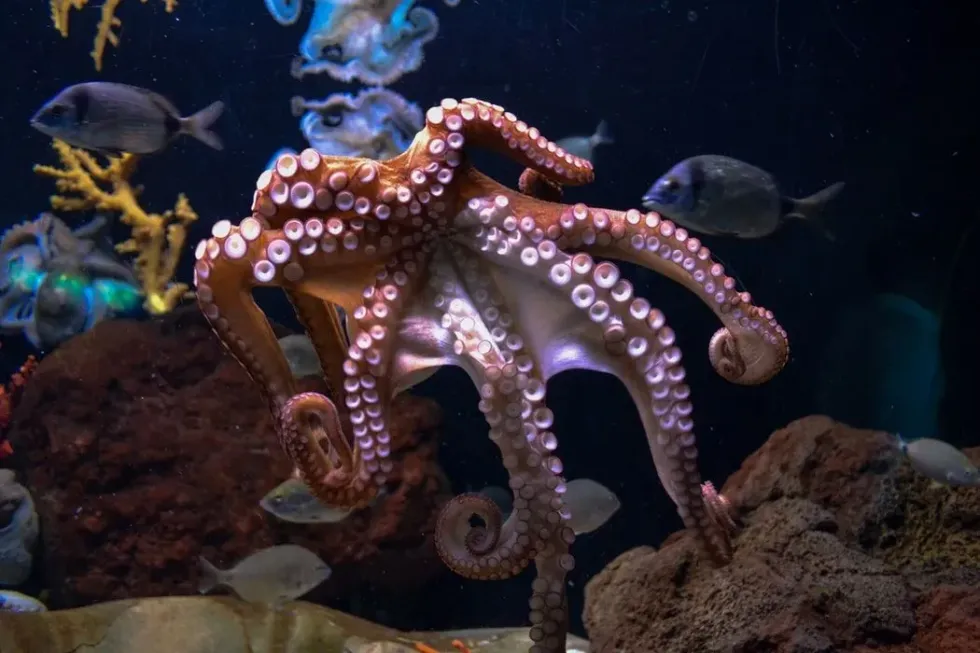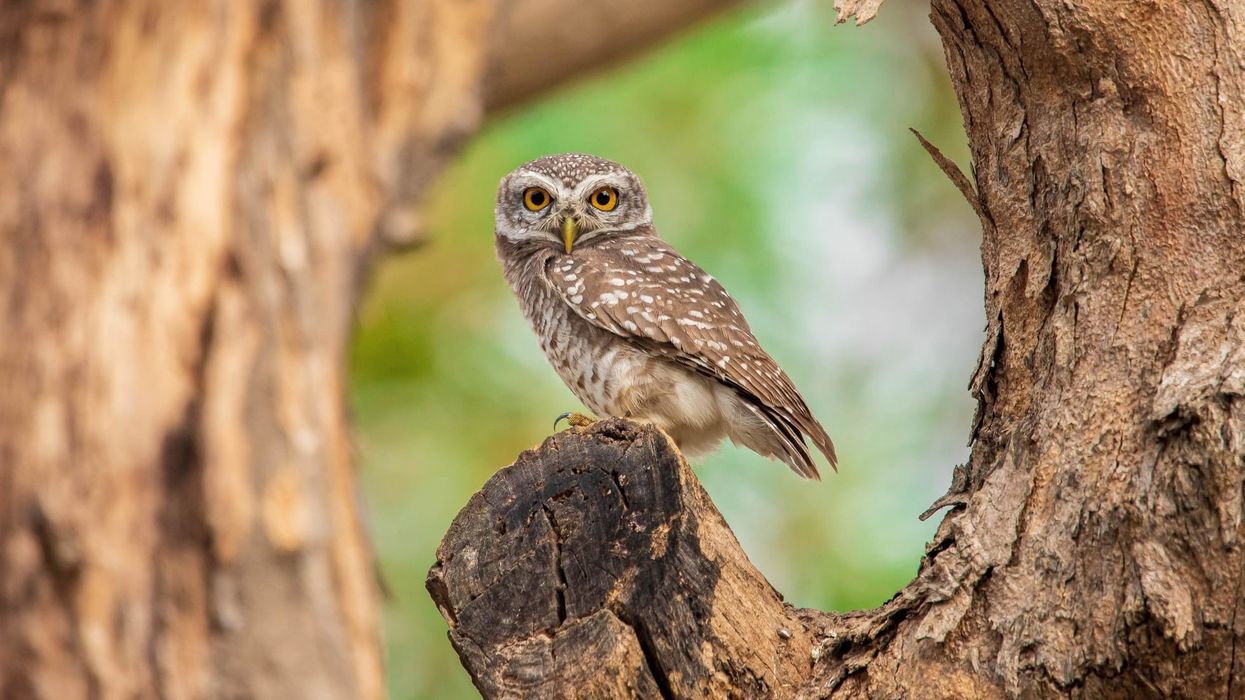Octopuses (Octopus vulgaris) are some of the most common species worldwide. They are found in every ocean and coastal marine waters of all continents.
They are strange-looking creatures with eight arms attached to a giant, bulbous head. There are more than 300 species of octopuses found worldwide, and new species are being discovered every day.
They are highly intelligent creatures, using their intellect to escape tricky situations, as well as using other defense mechanisms such as shooting ink or changing colors to camouflage. The octopus lifespan is about 1-3 years, and they die as soon as the mating process is over.
They reproduce by laying eggs and eat shells, crabs, fish, scallops as food. It expels its body waste through the siphon present in its body.
The creature has served as the inspiration for different monsters in many stories and legends. Perhaps the most famous of them is the Kraken which is a part of Scandinavian folklore and has been seen in many films. Other monsters that have found a place in urban folklores that are inspired by octopuses include Kanaloa, Cecaelia, and Akkorokamui.
In terms of grammar, the plural of octopus is octopuses, but other octopus plural terms are used, such as octopodes and octopi.
Check out the article to know more facts about octopus eyes, octopus brain, octopus mouth, octopus eye, octopus diet, octopus habitat, octopus intelligence, octopus tentacles, pet octopus, cute octopus, as well as blue-ringed octopus facts and octopus facts for kids.
If you like this article and want to read more about animals, read these interesting animal-related articles vampire squid and freshwater mussels.
Octopus Interesting Facts
What type of animal is an octopus?
Octopuses are cephalopods and invertebrates found in oceans worldwide.
What class of animal does an octopus belong to?
Octopuses (or octopi) belong to the Cephalopoda class of the Animalia kingdom.
How many octopuses are there in the world?
There are approximately 300 species of octopuses in the world. An exact figure is hard to provide since new species are being discovered daily.
Where does an octopus live?
Octopuses are found in oceans and coastal marine waters. They spend their time in crevices and small holes in corals and rocks, which qualify as their dens.
What is an octopus's habitat?
The octopus is found in coastal waters in all continents and every ocean worldwide. They are found along every coast of the United States.
Who do octopuses live with?
Octopuses typically are very territorial in nature and prefer to live in solitude.
How long does an octopus live?
These species live for about 1-3 years. However, the Giant Pacific Octopus can live up to five years.
How do they reproduce?
Octopuses practice external fertilization. The male has a specially modified arm called a hectocotylus, unlike the female. The males use these hectocotyli to inject their spermatophores directly into the female's tubular funnel. Sometimes, they hand over the sperm directly to the female.
The males die soon after the mating process. The females lay a cluster of 80 eggs on average, which they tend and guard to obsessively. As the eggs start to hatch, the cells inside the mother octopus's bodies begin to die, and they slowly embrace their death.
What is their conservation status?
Although any approximation of the total world population of octopuses is not provided, the numbers are exponentially increasing every day. Currently, they have been classified as Least Concern (LC) in the IUCN Red List.
Octopus Fun Facts
What do octopuses look like?

The common octopus is an invertebrate, and a cephalopod has a bulbous head and complex, sensitive, and large eyes and eight arms. It has a hard beak, and the mouth is on the underside.
A sack-like body is attached to the head that consists of a ring of eight equally long arms. It uses these arms to walk on the ocean bed.
The octopus can suck water into their mantle cavities and then squeezes it out of a tube called a siphon present at the front of their mantles to both steer and swim. They also have suction cups on each of their eight arms called suckers. These suckers help them to capture prey, move around, and grip rocks.
Octopuses possess specialized skin cells called chromatophores containing stretchy sacs known as cytoelastic sacculus. These sacs are with pigment, which can be yellow, black, brown, red in color. This helps them to camouflage and hide from predators. They also have muscles under their skin that they control to make themselves look bumpy or smooth.
The male octopus has a specially modified arm called a hectocotylus, unlike the female.
The word Cephalopoda in Greek that means 'head foot', and the name is justified as octopuses have their head and feet are merged.
How cute are they?
Octopus are generally strange-looking creatures and can seldom be described as cute. But a new species of octopus has been described that has a blob-like body, tiny flapping fins, and large eyes and is so adorable that it is officially named Opisthoteuthis adorabilis.
How do they communicate?
Octopuses are, generally, solitary animals, but new research has shown they frequently communicate with each other through changing their color and complex gestures of their arms. When two octopuses approach each other, displaying dark colors, the situation is going to take an aggressive turn. But if they display paler colors, the situation is amicable, and they are retreating.
How big is an octopus?
The various octopus species are of different sizes. The common octopus is relatively smaller compared to other octopuses and can grow up to about 36 in (91.4 cm).
The giant Pacific octopus is the largest octopus species in the world and has an arm span of 168 in (426.7 cm). However, in the squid vs. octopus debate, the giant Pacific octopus is only one-seventh the size of the Giant Squid, which can grow above 700 in.
The red octopus grows to about 20 in (50.8 cm). The blue-ringed octopus grows to about 5-8 in (12-20 cm).
How fast can octopuses move?
The common octopus has a top swimming speed of 24.9 mph (40 km/h). It can suck water into their mantle cavities and then squeezes it out of a tube called a siphon present at the front of their mantles to move at such great speed. This method is called propulsion.
How much does an octopus weigh?
The different species of octopuses have different weights. The common octopus weighs up to 22 lb (9.9 kg).
The giant Pacific octopus is the largest octopus species in the world and usually weighs around 33 lb (15 kg). One such specimen has even been weighed to be around 600 lb (272 kg). The pygmy octopus weighs less than 0.002 lb (1 g).
What are their male and female names of the species?
There are no specific names for the male and female of these species.
What would you call a baby octopus?
Baby octopuses are called larvae when they hatch.
What do they eat?
Newly hatched octopuses called larvae consume small food such as sea stars, copepods, and larval crabs. Adult octopuses devour clams, small fishes, crabs, shells, snails, and even other octopuses as food. They consume food through their mantle cavities, and they use the same organ to release excreted waste.
Are they dangerous?
All octopuses are known to be venomous. But most of them are not fatally dangerous. The blue-ringed octopus is considered to be one of the most poisonous creatures known. Their venom is potent enough to kill ten mature adults.
Their venom contains the neurotoxin tetrodotoxin, which causes respiratory arrest. Octopuses also squirt ink which not only helps them to hide but also acts as a defense mechanism. The ink contains a compound called tyrosinase which causes a blinding irritation when sprayed in the eyes of the attacker.
Would they make a good pet?
Though they are resourceful, inquisitive, and playful in nature, and some species are even known to bond with each other, octopuses, in general, are not a good choice for a pet. Biologists consider these creatures to be some of the most intelligent animal species, and hence they get easily bored in an average fish tank.
Most of these creatures do not last for more than 12 - 14 months and known to survive for two years at most under ideal conditions.
Did you know...
The octopi have blue blood, which is rich in copper-based hemocyanin. This is because copper is more effective for transporting oxygen in low temperatures.
Octopuses have three hearts, out of which one keeps circulation flowing for their organs, while the other two hearts are for moving blood beyond their gills. The organ heart is known to stop beating when the octopus swims, and this exhausts them. So this species of cephalopods prefer crawling rather than swimming.
Octopuses have nine brains in all. Eight brains are for the eight arms, while the remaining one is for centralized body control.
Two-thirds of the neurons of an octopus are in its arms, and hence these arms can act on their own while the animal is busy doing something else. The arms can even react after they have been entirely severed.
How smart are octopuses?
Octopuses are considered the smartest invertebrates on earth. They have been documented to unscrew jar lids, use tools, and camouflage accordingly with their surroundings. They use their sharp intellect to escape critical situations easily.
How to cook octopus?
The most simple octopus recipe is to simmer it in liquid, such as saline water. Boil a saucepan with salted water and then add the octopus, immediately reducing the heat.
Simmer the octopus gently for a quarter of an hour to an hour. Cooking it fast will give it a chewy, rubbery texture. Octopus contains a lot of moisture.
The moisture can be removed by sun-drying to make the flesh more tender before grilling, barbecuing, or pan-frying. Without removing some of the moisture from the flesh, the octopus will take on a chewy and rubbery texture.
Grilled octopus has a very delicate flavor, and dressing it with some good olive oil and seasoning it well is often enough. It tastes like a lobster when properly cooked and does not have any fishy smell, contrary to popular belief.
Here at Kidadl, we have carefully created lots of interesting family-friendly animal facts for everyone to discover! Learn more about some other arthropods including orb-weaver spider, or house centipede.
You can even occupy yourself at home by drawing one on our octopus coloring pages.










